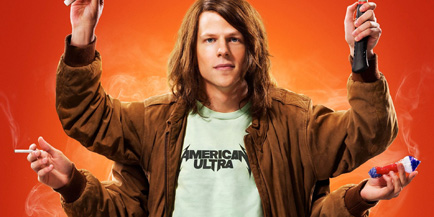|
|
Movie Review: American UltraBy Ben GruchowAugust 25, 2015
So with all these favorable marks, why am I only giving American Ultra a “maybe” for success? The movie steps wrong in two areas: one middling, and one major. The major one is Topher Grace’s CIA bureaucrat Adrian Yates. In a film that’s possessed of a surprising unification in its character approach, he sticks out like a sore thumb. We don’t buy him as a leader, or as a threat, or as any kind of force to be reckoned with. Don’t get me wrong; Grace does good enough work translating Yates to the screen. The character itself is broken; every time the movie cuts to a scene involving him, it loses traction and momentum rapidly, and the character’s escalating hysteria seems to have wandered in from another, much dorkier movie. The middling issue is probably down to me being ungrateful toward a movie that aims higher than its target for most of its running time instead of all of it. There is a point where the movie appears to be on the verge of ending and cutting to credits; if American Ultra had done so at this point, it would have been surprising, unconventional, and absolutely fair. There is, by this point, nothing left we need to really learn about our characters, and it would have closed out this deranged little adventure on an unambiguous high point. Instead, the movie keeps going for another four or five minutes. It’s only three scenes, really; they’re short, and they’re well-acted. Those final minutes, though, serve to let quite a lot of air out of the movie’s climactic sequence and resolution. Sometimes you don’t need to know what happens after the fireworks finish going off, and needless explication of character resolution can become tiresome. It’s honestly the most tonally moderate and commercial part of a movie that is messy, undisciplined, utterly implausible, with a reach that exceeds its grasp - but absolutely its own creature, and one that’s decidedly not assembled from the standard genre parts.
|

|
|
|

|
Friday, November 1, 2024
© 2024 Box Office Prophets, a division of One Of Us, Inc.


